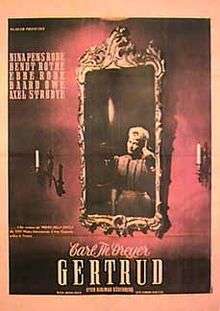Gertrud (play)
Gertrud is a Swedish 1906 play (drama), in three parts, by author and playwright Hjalmar Söderberg.
Story description
The play is a modern relationship drama (in Sweden often considered as one of the very best Swedish plays ever written) with the middle-age Gertrud in the centre and about her relationships with three different men; her husband Gustav Kanning (a politician), her older, former lover Gabriel Lidman (a poet) and her newfound love Erland Jansson (a young composer): men who have desired — and desire her — in three different ways.
The first act is set in Gustaf Kanning's study at home where Gertrud in the dark, in the first scene, awaits her husband's return from work as she has something important to tell: she's going to leave him. How will Kanning react to this? How will her former love interest — who suddenly returns from a long trip overseas — react? Is her newfound love worth the sacrifice she is about to make?
The play is a penetrating drama on life, love and passion. About the feeling of being trapped and confined in a marriage, the need of love and the search of THE LOVE; but does it exist? How does it show itself and what is real love anyway? Is it a fundamental right to love and be loved? It's also a play about how we all value love and closeness in a relationship — and the need and importance of it in our lives — so completely different. Women and men, and from man to man and woman to woman. Why is it all so difficult?
Gertrude
Gertrude or Gertrud may refer to:
Places named Gertrude:
People with Gertrude as the full name:

Gertrud (film)
Gertrud (Danish pronunciation: [ˈɡeɐˤtʁʊð̞]) is a 1964 Danish drama film directed by Carl Theodor Dreyer, based on the 1906 play of the same name by Hjalmar Söderberg. The title role of Gertrud Kanning is played by Nina Pens Rode, with Bendt Rothe as her husband, Gustav Kanning, and Baard Owe as her lover, Erland Jansson.
Gertrud was Dreyer's final film. It is notable for its many long takes, which include a 9 minute, 56 second take of Gertrud and her ex-lover, Gabriel, talking about their pasts.
Plot
Gertrud, a former opera singer in Stockholm in the early 20th century, is married to the lawyer and politician Gustav Kanning. Gertrud tells her husband that he has become more in love with his career and status than with her. She also tells him that she has met another man who loves her more than anything else, and that she therefore prefers him to her husband and wants a divorce.
Gertrud meets her lover, the promising young pianist Erland Jansson, in a park. The two go to Jansson's house. Gertrud tells him how devoted she is to him. In the evening Gustav goes to pick Gertrud up at the opera where she had said she would be, but can't find her. The next evening the Kannings attend a dinner party at the house of the poet Gabriel Lidman, with whom Gertrud has had a relationship in the past. Gertrud greets her friend Axel Nygren who attends the same party. Gustav confronts Gertrud about the opera, and demands one last night with her before the separation. Lidman tells Gertrud that he had met Jansson at a party where he had bragged about Gertrud as his latest conquest.
710 Gertrud
710 Gertrud is a Themistian asteroid, which means it is a member of the Themis family of asteroids. It was discovered by Austrian astronomer Johann Palisa on February 28, 1911 from Vienna.
The light curve of 710 Gertrud shows a periodicity of 10.02 ± 0.03 hours, during which time the brightness of the object varies by 0.35 ± 0.04 in magnitude.
References
External links
Play (Joanna MacGregor album)
Play is a 2002 album by Joanna MacGregor. The album was released on the SoundCircus label and was a nominee for the Mercury Music Prize.
References

Play (telecommunications)
Play, P4 is a brand name of the fourth Polish cellular telecommunications provider.
Icelandic-led Novator acquired a large stake in the company.
Network
Play is the third biggest cellular network in Poland. PLAY uses EGSM 900 and GSM1800 for its 2G services, UMTS 2100 and UMTS 900 for 3G and LTE1800 and LTE2100 for LTE. Its MCC is 260-06. Thanks to domestic roaming with Polkomtel (Plus) and Centertel (Orange), Play is a nationwide cellular carrier.
Native Network
As of November 3, 2013, Play Mobile has 3288 EGSM 900 BTS, 4143 UMTS 2100 nodeB and 2175 UMTS 900 nodeB's. UMTS 900 and UMTS 2100 network Play calls the 4G network. Currently 82% of population is covered with Play's native 4G network and 40% of population with 2G network. 4G is available in more than 300 cities and towns around Poland. Play started building its 3G network at the beginning of its existence (2007) and announced that its goal is to cover all of Poland with UMTS while provide GSM services through roaming. Play began building its GSM network in March 2009 in apparent bid to reduce roaming costs. EGSM 900 BTS and UMTS 900 nodeB use the same licence frequency. In place when are EGSM 900 usually is not UMTS 900. Play Mobile Broadband (Play Online) products does not used 2G network.

Us Against the World (Play album)
Us Against the World is the debut album by Swedish girl group Play, released on 12 December 2001. In the United States, it was released as the self-titled EP Play. The album spent six weeks on the Billboard 200, peaking at #85 on 17 August 2002, and on 24 March 2003 the album was certified Gold by the RIAA. The songs "Us Against the World" and "Cinderella" were released as singles.
Track listing
EP
Personnel
References
External links
Podcasts:

